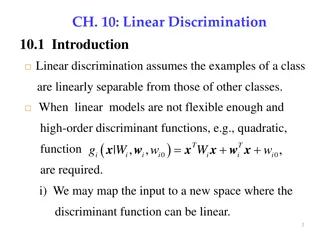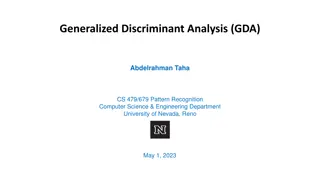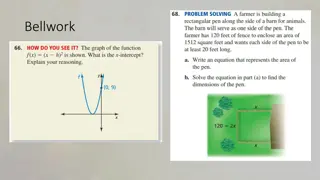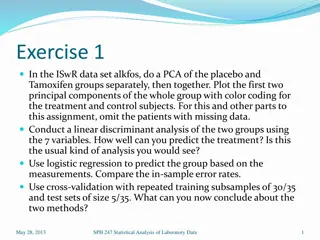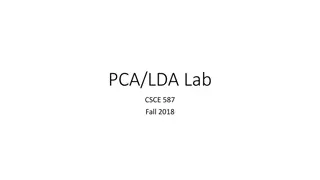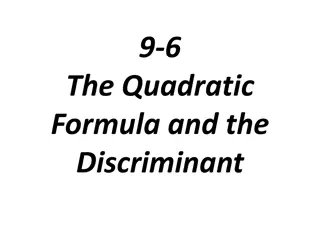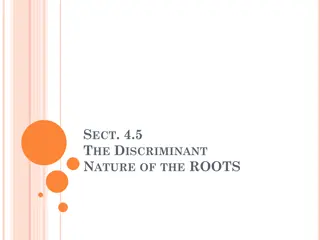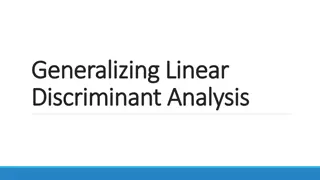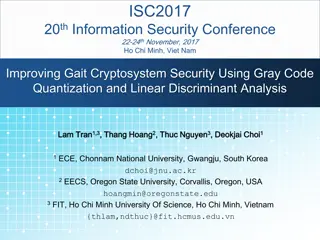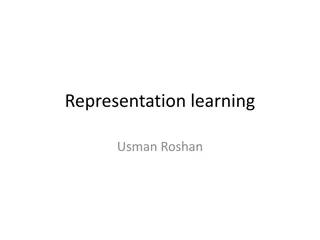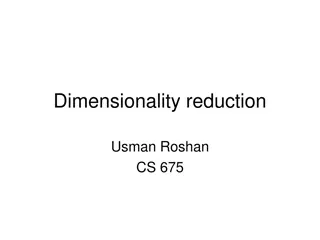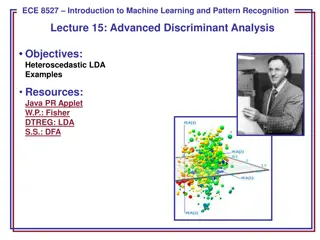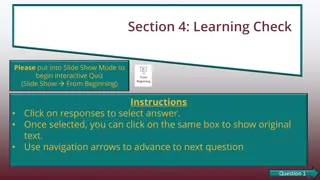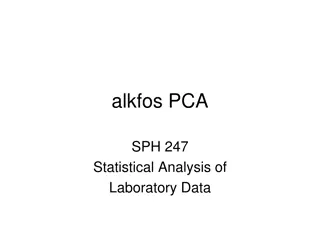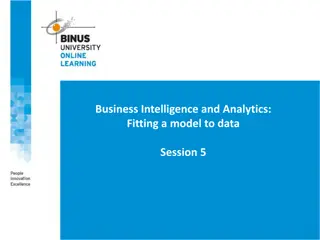Linear Discrimination for Classification
Linear discrimination is a method for classifying data where examples from one class are separable from others. It involves using linear models or high-order functions like quadratic to map inputs to class separable spaces. This approach can be further categorized as class-based or boundary-based, e
5 views • 37 slides
Generalized Discriminant Analysis (GDA) in Pattern Recognition
Generalized Discriminant Analysis (GDA) is a nonlinear form of Linear Discriminant Analysis (LDA) that utilizes kernel methods to find discriminatory features for optimal class separability. LDA aims to maximize the between-class covariance matrix while minimizing the within-class covariance matrix.
7 views • 17 slides
Quadratic Formula Applications and Problem-solving Scenarios
Explore the applications of the quadratic formula through real-life scenarios involving jugglers, archers, and mathematical derivations. Learn how to analyze the discriminant and solve quadratic equations to find solutions in physics and target shooting. Discover the principles behind the formula an
1 views • 14 slides
Determining Email Spam using Statistical Analysis and Machine Learning
The discussion revolves around classifying spam from ham emails by analyzing word frequencies. Various techniques such as Logistic Regression, Linear Discriminant Analysis, and 10-fold Cross-Validation are employed to achieve this goal. Statistical analysis and machine learning models like LDA and L
4 views • 8 slides
Automatic Extraction Model of Thesis Research Conclusion Sentences
Full-text academic literature contains rich data that can be analyzed using machine learning techniques. This research focuses on extracting thesis research conclusion sentences automatically to enhance summarization processes. The study involves data processing, annotation, and creating discriminan
1 views • 9 slides
Algorithm Performance in Data Set 1 with LDA, CART, and K-Means
Utilizing Linear Discriminant Analysis (LDA), Classification and Regression Trees (CART), and K-Means algorithms on Data Set 1. CART training involved tuning the number of leaves for optimal performance, while LDA explored covariance variations and discriminant types. The K-Means method was applied
8 views • 15 slides
Solving Equations Involving Hyperbolas and Parabolas
Utilize substitution to solve equations involving hyperbolas and parabolas that touch at specific points. Discover the values of variables by manipulating equations and identifying intersections between the curves. Utilize the discriminant to solve for double roots and tangent points effectively.
4 views • 9 slides
Statistical Analysis of Laboratory Data: Principal Component Analysis and Linear Discriminant Analysis
Conducting a comprehensive statistical analysis on the ISwR dataset "alkfos," this project involves performing PCA on the placebo and Tamoxifen groups separately and together, followed by plotting the first two principal components with color-coded treatment information. Additionally, linear discrim
1 views • 15 slides
Chemometric Analysis for Pollution Monitoring Dataset
The study applies chemometric techniques to analyze a pollution monitoring dataset of the Brda river, focusing on cluster analysis, principal component analysis, discriminant analysis, and factor analysis. Results confirm water purity classification by the Inspection of Environmental Protection, rev
4 views • 23 slides
PCA/LDA Lab
This lab focuses on exploring the concepts of Principal Component Analysis (PCA) and Linear Discriminant Analysis (LDA) using the iris dataset. It covers step-by-step instructions on performing PCA to extract independent variables, generating principal components, calculating variance, plotting comp
3 views • 17 slides
Quadratic Formula and Discriminant in Mathematics
Quadratic formula and discriminant in algebraic equations. Understand how to find solutions using the quadratic formula and analyze the number of real solutions using the discriminant. Discover the role of discriminant in determining the nature of roots in quadratic equations.
2 views • 8 slides
Alcoholic Hepatitis: Case Study & Treatment Insights
Alcoholic hepatitis case study of a 49-year-old male with comorbidities presenting with abdominal pain, altered mental status, and skin color changes. Explore vital signs, lab results, pathogenesis, severity classification, and trials on prednisolone and pentoxyphylline. Discover the impact of TNF a
2 views • 36 slides
Selection Across Four Generations in Chinook Salmon Breeding Program
An evaluation of selection across four generations within a Chinook salmon supportive breeding program, exploring genetic divergence, identifying associated loci with phenotypic traits, and ongoing research. The study compares segregated vs. integrated wild populations, examines the impact of manage
0 views • 27 slides
Solving Linear and Quadratic Inequalities with Graphs
Learn how to solve linear and quadratic inequalities by visualizing them as graphs. Understand the concept of determining parts of the graph that satisfy the inequality conditions with step-by-step examples. Practice solving various types of inequalities and improve your understanding of discriminan
2 views • 14 slides
Linear Discriminant Analysis in Dimensionality Reduction
Linear Discriminant Analysis (LDA) is a technique used to project a high-dimensional feature space onto a lower-dimensional space while maintaining class separation. By focusing on means and finding dimensions that separate them effectively, LDA helps reduce computational costs and minimize overfitt
1 views • 37 slides
From Linear Classifiers to Neural Networks - A Comprehensive Overview
This content delves into the transition from linear classifiers to neural networks, covering topics such as discriminant functions, cost functions, loss functions, and the structure of linear classifiers. Explore the representation power of sigmoidal neural networks and the challenges posed by non-d
2 views • 33 slides
Enhancing Gait Data Security Using Gray Code Quantization
This paper discusses techniques to improve the security of gait data in biometric cryptosystems by addressing issues such as low discriminability and high data variation. The proposed methods involve utilizing Linear Discriminant Analysis and Gray Code Quantization to enhance security and reduce fal
2 views • 25 slides
Logistic Regression and Weighted Least Squares Analysis
Logistic regression is a widely-used method for analyzing the relationship between a binary dependent variable and independent variables, producing probability predictions constrained within (0,1). On the other hand, Weighted Least Squares (WLS) assigns varying weights to observations to correct for
1 views • 27 slides
Exploring Representation Learning Methods and Theoretical Concepts
Discover the principles and applications of representation learning in machine learning, including neural networks, deep convolution networks (CNN), and random hyperplanes. Learn about techniques like linear discriminant analysis, feature selection, and more. Delve into theoretical aspects such as c
1 views • 9 slides
Construct Validity in Educational Research
Discover the importance of construct validity in educational research, where evidence is crucial to ensure tests accurately measure intended constructs. Learn about convergent and discriminant validity and their role in establishing the validity of assessments. Explore a practical example in digital
0 views • 9 slides
Linear Discriminant Analysis for Dimensionality Reduction
Explore the concept of Linear Discriminant Analysis (LDA) as a supervised dimensionality reduction technique. Learn how LDA maximizes the ratio of difference means to the sum of variance, utilizing scatter matrices and Fisher linear discriminant solutions for improved data separation.
2 views • 30 slides
LDA for Data Analysis
Dive into Linear Discriminant Analysis (LDA) to comprehend its role in data analysis. Learn about its limitations, differences from PCA, and how it supports classification tasks. Explore the idea behind LDA and its application in handling non-Gaussian distributions for improved data classification.
1 views • 22 slides
Linear Discriminant Analysis
Linear Discriminant Analysis (LDA) and Quadratic Discriminant Analysis (QDA) are powerful techniques in machine learning for separating data based on labeled information. LDA uses a linear hyperplane, while QDA employs a quadratic surface for classification. This method is easy to visualize in 2D, m
0 views • 35 slides
Advanced Discriminant Analysis for Heteroscedasticity in Machine Learning
Explore Heteroscedastic Linear Discriminant Analysis (HLDA) for handling random variables with varying variances in machine learning. Learn about partitioning parameter vectors and understanding density and likelihood functions for optimal solutions in pattern recognition.
3 views • 6 slides
Cluster Analysis in Multivariate Statistics
This content delves into various multivariate statistical techniques such as PCA, correspondence analysis, canonical correlation, discriminant function analysis, cluster analysis, and MANOVA. It includes examples of using cluster analysis to group data points using hierarchical clustering and k-mean
2 views • 6 slides
Learning Check: Understanding Validity Evidence in Educational Testing
Enhance your knowledge about validity evidence in educational testing through an interactive quiz covering topics such as validity arguments, convergent and discriminant validity, and evidence of dimensionality. Test your understanding and improve your grasp on key concepts in educational measuremen
1 views • 5 slides
15-110: Principles of Computing - Decision Structures Part II Lecture 6, September 18, 2018
Today's session focuses on multi-way decisions in decision structures and revisits a quadratic equation solver in Python. The program encounters a math domain error due to a negative discriminant, preventing computation of square roots for negative numbers. The solution involves checking the discrim
3 views • 33 slides
Statistical Analysis of Laboratory Data Using PCA and LDA Techniques
Explore the statistical analysis of laboratory data employing Principal Component Analysis (PCA) and Linear Discriminant Analysis (LDA). The data includes variables like alkaline phosphatase (alkfos) levels, grouped data, complete cases analysis, and prediction of group classifications. Visualizatio
2 views • 8 slides
Fitting a Model to Data: Linear Classifiers and Discriminant Functions
Explore the concepts of fitting a model to data using linear classifiers like linear regression and logistic regression, and linear discriminant functions. Learn about simplifying assumptions for classification, agenda topics such as tree induction vs. logistic regression, and the instance-space vie
2 views • 30 slides
Understanding Discrimination and Classification Methods
Discrimination and classification methods aim to separate cases into known groups based on measurement variables. Learn how these methods work, their notation, concepts, setting up discriminant functions, and mathematical notations for classifying populations. Explore prior probabilities, misclassif
2 views • 13 slides
Advanced Representation Learning Techniques and Theoretical Insights
Explore advanced methods in representation learning such as neural networks, deep convolution networks, and linear discriminant analysis. Dive into the theoretical aspects of creating suitable linear spaces for classification, along with the concept of random hyperplanes and their applications in da
2 views • 9 slides
Optimal Techniques for Event Classification in High Energy Physics Analysis
Delve into the complexities of event classification in High Energy Physics analysis, exploring discriminating variables, optimal cut selection, and various techniques like Principal Component Analysis, Fisher Discriminant, Neural Networks, Probability Density Estimation, and Empirical Modeling. Lear
2 views • 68 slides
Advanced Discriminant Analysis and HLDA in Machine Learning
Explore Heteroscedastic Linear Discriminant Analysis (HLDA) for advanced pattern recognition. Learn about the partitioning methods and density functions involved in this discriminant analysis. Understand the optimal solutions and iterative processes for handling variances in ML models effectively.
0 views • 9 slides
Linear Discriminant Analysis Overview
Linear discriminant analysis (LDA) is a method for finding efficient directions to discriminate between classes by optimizing the orientation of a line onto which data is projected. This content explores the concepts of separation of means and scatter, Fisher linear discriminant analysis, and the cr
1 views • 9 slides
Understanding Quadratics: Investigating the Discriminant
Learn how to use the discriminant in quadratic equations to determine the nature of roots. Explore the impact of the discriminant on the graphs of various functions and its significance in solving equations. Use tools like Geogebra to deepen your understanding and draw conclusions about its effects.
3 views • 11 slides
